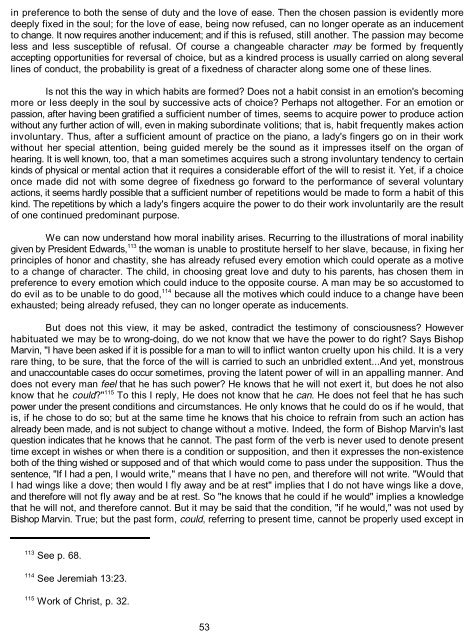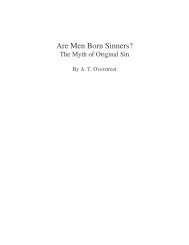Foreknowledge by Joel Hayes - Library of Theology
Foreknowledge by Joel Hayes - Library of Theology
Foreknowledge by Joel Hayes - Library of Theology
You also want an ePaper? Increase the reach of your titles
YUMPU automatically turns print PDFs into web optimized ePapers that Google loves.
in preference to both the sense <strong>of</strong> duty and the love <strong>of</strong> ease. Then the chosen passion is evidently more<br />
deeply fixed in the soul; for the love <strong>of</strong> ease, being now refused, can no longer operate as an inducement<br />
to change. It now requires another inducement; and if this is refused, still another. The passion may become<br />
less and less susceptible <strong>of</strong> refusal. Of course a changeable character may be formed <strong>by</strong> frequently<br />
accepting opportunities for reversal <strong>of</strong> choice, but as a kindred process is usually carried on along several<br />
lines <strong>of</strong> conduct, the probability is great <strong>of</strong> a fixedness <strong>of</strong> character along some one <strong>of</strong> these lines.<br />
Is not this the way in which habits are formed? Does not a habit consist in an emotion's becoming<br />
more or less deeply in the soul <strong>by</strong> successive acts <strong>of</strong> choice? Perhaps not altogether. For an emotion or<br />
passion, after having been gratified a sufficient number <strong>of</strong> times, seems to acquire power to produce action<br />
without any further action <strong>of</strong> will, even in making subordinate volitions; that is, habit frequently makes action<br />
involuntary. Thus, after a sufficient amount <strong>of</strong> practice on the piano, a lady's fingers go on in their work<br />
without her special attention, being guided merely be the sound as it impresses itself on the organ <strong>of</strong><br />
hearing. It is well known, too, that a man sometimes acquires such a strong involuntary tendency to certain<br />
kinds <strong>of</strong> physical or mental action that it requires a considerable effort <strong>of</strong> the will to resist it. Yet, if a choice<br />
once made did not with some degree <strong>of</strong> fixedness go forward to the performance <strong>of</strong> several voluntary<br />
actions, it seems hardly possible that a sufficient number <strong>of</strong> repetitions would be made to form a habit <strong>of</strong> this<br />
kind. The repetitions <strong>by</strong> which a lady's fingers acquire the power to do their work involuntarily are the result<br />
<strong>of</strong> one continued predominant purpose.<br />
We can now understand how moral inability arises. Recurring to the illustrations <strong>of</strong> moral inability<br />
113<br />
given <strong>by</strong> President Edwards, the woman is unable to prostitute herself to her slave, because, in fixing her<br />
principles <strong>of</strong> honor and chastity, she has already refused every emotion which could operate as a motive<br />
to a change <strong>of</strong> character. The child, in choosing great love and duty to his parents, has chosen them in<br />
preference to every emotion which could induce to the opposite course. A man may be so accustomed to<br />
114<br />
do evil as to be unable to do good, because all the motives which could induce to a change have been<br />
exhausted; being already refused, they can no longer operate as inducements.<br />
But does not this view, it may be asked, contradict the testimony <strong>of</strong> consciousness? However<br />
habituated we may be to wrong-doing, do we not know that we have the power to do right? Says Bishop<br />
Marvin, "I have been asked if it is possible for a man to will to inflict wanton cruelty upon his child. It is a very<br />
rare thing, to be sure, that the force <strong>of</strong> the will is carried to such an unbridled extent...And yet, monstrous<br />
and unaccountable cases do occur sometimes, proving the latent power <strong>of</strong> will in an appalling manner. And<br />
does not every man feel that he has such power? He knows that he will not exert it, but does he not also<br />
115<br />
know that he could?" To this I reply, He does not know that he can. He does not feel that he has such<br />
power under the present conditions and circumstances. He only knows that he could do os if he would, that<br />
is, if he chose to do so; but at the same time he knows that his choice to refrain from such an action has<br />
already been made, and is not subject to change without a motive. Indeed, the form <strong>of</strong> Bishop Marvin's last<br />
question indicates that he knows that he cannot. The past form <strong>of</strong> the verb is never used to denote present<br />
time except in wishes or when there is a condition or supposition, and then it expresses the non-existence<br />
both <strong>of</strong> the thing wished or supposed and <strong>of</strong> that which would come to pass under the supposition. Thus the<br />
sentence, "If I had a pen, I would write," means that I have no pen, and therefore will not write. "Would that<br />
I had wings like a dove; then would I fly away and be at rest" implies that I do not have wings like a dove,<br />
and therefore will not fly away and be at rest. So "he knows that he could if he would" implies a knowledge<br />
that he will not, and therefore cannot. But it may be said that the condition, "if he would," was not used <strong>by</strong><br />
Bishop Marvin. True; but the past form, could, referring to present time, cannot be properly used except in<br />
113<br />
See p. 68.<br />
114<br />
115<br />
See Jeremiah 13:23.<br />
Work <strong>of</strong> Christ, p. 32.<br />
53






